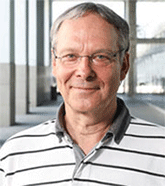SPS BISP TC Webinar: 5 July 2022, by Dr. Michael Unser

IEEE SPS BISP TC Webinar
(Organized by the IEEE SPS Biomedical Imaging and Signal Processing Technical Committee (BISP TC))
Title: Splines and Imaging: From Compressed Sensing to Neural Nets
Date: 5 July 2022
Time: 4:00 PM (Central European Time) Your local time
Duration: Approximately 1 Hour
Presenters: Dr. Michael Unser
Register for the webinar to acquire Zoom link!
About the topic:
The intent of this webinar is to demonstrate the optimality of splines for the resolution of inverse problems in imaging and the design of deep neural networks. To that end, I first present a representer theorem that states that the extremal points of a broad class of linear inverse problems with a generalized total-variation constraint are adaptive splines whose type is linked to the underlying regularization operator. When the latter is the second-order derivative operator, then the optimal reconstruction is an adaptive piecewise-linear spline with the smallest possible number of breakpoints. These splines are intrinsically sparse, and hence compatible with the kind of formulation (and algorithms) used in compressed sensing. I then show that these results are relevant to the investigation of neural networks as well. In particular, they yield a functional interpretation of shallow, infinite-width ReLU neural nets. Sparse adaptive splines also turn out to be ideally suited for the specification of deep neural networks with free-form activations.
About the presenter:

Michael Unser is professor and director of EPFL's Biomedical Imaging Group, Lausanne, Switzerland. His primary area of investigation is biomedical image processing. He is internationally recognized for his research contributions to sampling theory, wavelets, the use of splines for image processing, stochastic processes, and computational bioimaging. He has published over 350 journal papers on those topics. He is the author (along with P. Tafti) of the book An Introduction to Sparse Stochastic Processes, Cambridge University Press, 2014. From 1985 to 1997, he was with the Biomedical Engineering and Instrumentation Program, National Institutes of Health, Bethesda USA, conducting research on bioimaging.
Dr. Unser has served on the editorial board of most of the primary journals in his field including the IEEE Transactions on Medical Imaging (Associate Editor-in-Chief 2003-2005), IEEE Transactions on Image Processing, Proceedings of the IEEE, and SIAM Journal of Imaging Sciences. He is the founding chair of the technical committee on Bio-Imaging and Signal Processing (BISP) of the IEEE Signal Processing Society. He is a fellow of the IEEE (1999), an EURASIP fellow (2009), and a member of the Swiss Academy of Engineering Sciences. He is the recipient of several international prizes including five IEEE-SPS Best Paper Awards, two Technical Achievement Awards from the IEEE (2008 SPS and EMBS 2010), the Technical Achievement Award from EURASIP (2018), and a recent Career Achievement Award (IEEE EMBS 2020).

